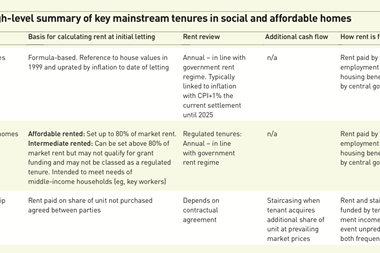Institutional investment in social and affordable housing has been growing in recent years, but a new report published today by the Impact Investing Institute, Homes England and the Investment Property Forum (IPF) is intended to accelerate the trend.
The report, Is there an investment case for social and affordable housing in the UK?, outlines the reasons why the sector could “become an increasingly significant component of institutional investment portfolios”, while setting out unique challenges and risks that need to be addressed.
The authors, Nick Colley and Jane Fear of Property Funds Research, found that investment in social housing – both debt and equity – should increase the risk-adjusted returns of multi-asset and real estate portfolios, and generate resilient, stable and diversified cash flows – while also fulfilling a “a key element of the ESG agenda for investors”.
They also acknowledged that unique challenges and risks need to be addressed, including resource-intensive day-to-day management, changing regulations, reputational risks, and potential conflicts of interest relating to affordability and financial returns.
Comparable conclusions were drawn in an earlier article by Colley, published by IPE Real Assets at the start of year.
The report was commissioned by the Impact Investing Institute, a not-for-profit organisation that was set up in 2019 to accelerate the growth of impact investing in the UK. A shortfall of affordable housing in the UK is one of its areas of focus. Homes England, a public body, and the IPF, a real estate industry member organisation, funded the research.
As IPE Real Assets has reported, social and affordable-housing funds and strategies in the UK have been gaining traction with institutional investors in recent years, but there is a recognition that the trend needs to be accelerated.
The issue was raised at the IPE Real Assets & Infrastructure Global Investor Conference in May. In June, the British Property Federation launched an affordable-housing committee to “provide leadership” in the area for the real estate industry.
Commenting on the launch of the report today, Jamie Broderick, lead expert of the Impact Investing Institute, said: “Social housing is an important sector for impact investing, as it addresses a large and urgent social need, while also providing investment characteristics that can be additive to institutional portfolios, including pensions.
“Our hope is that this report will expand investor interest in both debt and equity sectors of the market, providing housing associations with more diverse options in accessing capital for the vital work they do.”
Harry Swales, CIO of Homes England, said: “Institutional investment in new affordable housing has a critical role to play in addressing the undersupply of housing in the UK.
“Homes England is pleased to support this report from the Impact Investing Institute. It presents a compelling case for the positive influence that allocations to social and affordable housing can have on returns in a diversified portfolio.
“We see long-term institutional capital and affordable housing as a natural fit and are keen to support new entrants ready to commit to the delivery of high-quality affordable homes.”
Ben Denton, managing director of Legal & General Affordable Homes and member of the IPF’s residential investment group, said: “To date, there has been little research into social and affordable housing and this study provides some welcome insights into its investment potential, as well as a comprehensive introduction to the workings of the market and its key participants.
“With significant and growing institutional interest in this sector, the study is a helpful and informative summary of the key areas driving risk and return.”
Earlier this year, the Impact Investing Institute, the Good Economy and Pensions For Purpose published a report that argued for greater allocations by UK institutional investors to “placed-based”, including housing.
This summer, Prime Minister Boris Johnson and Chancellor Rishi Sunak also called on domestic pension funds to invest more in UK infrastructure, including housing.


















